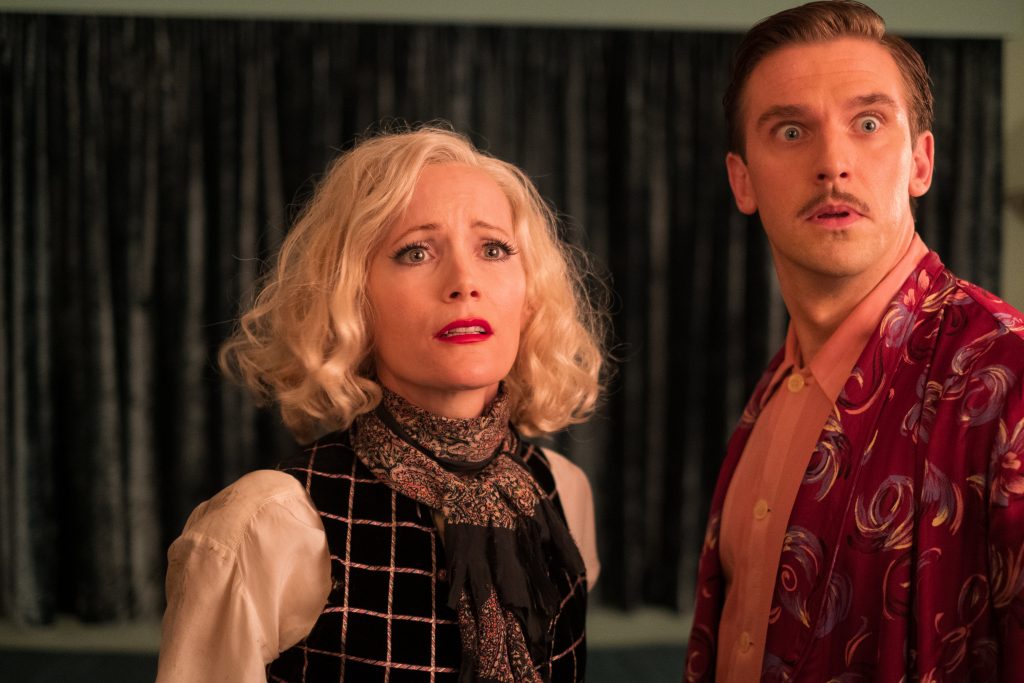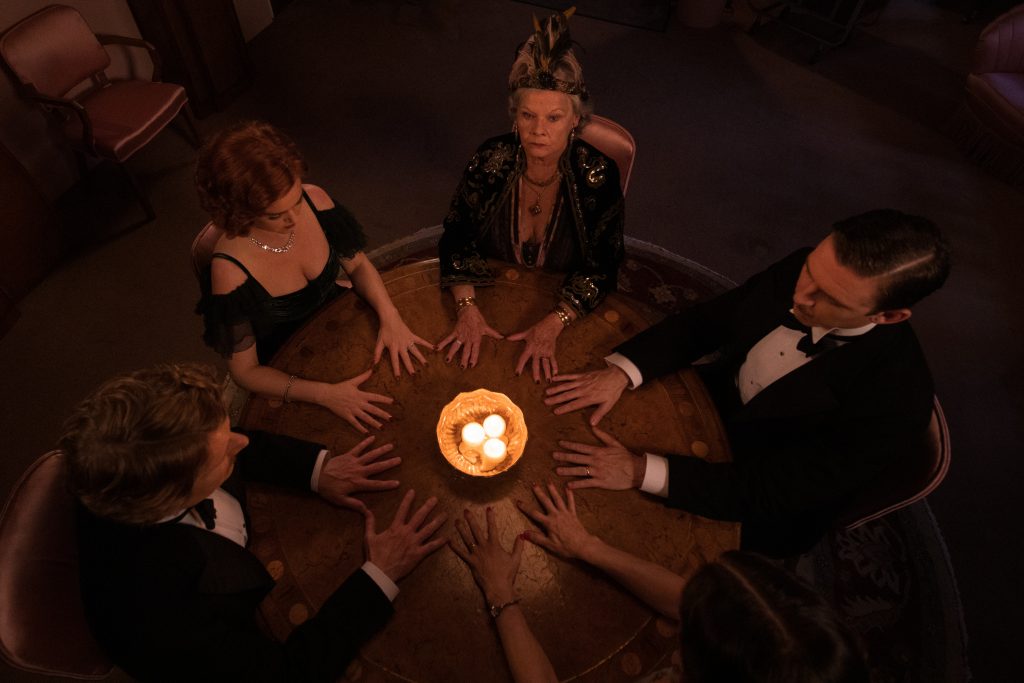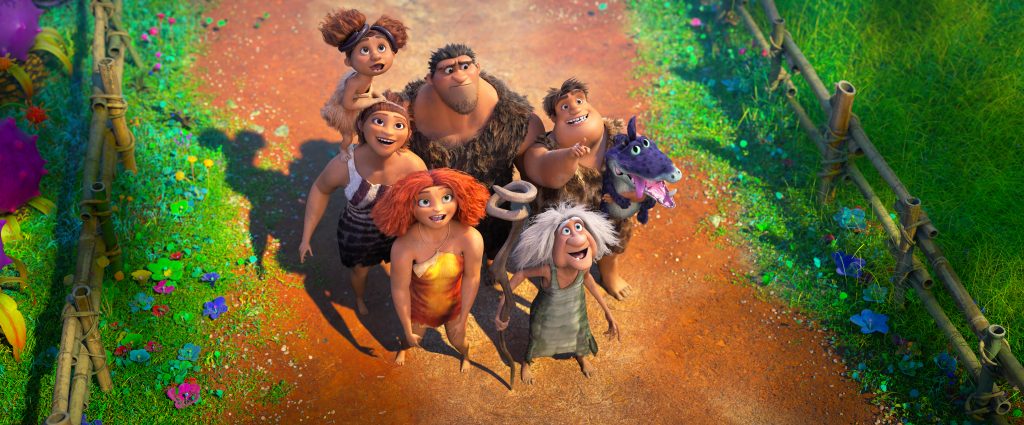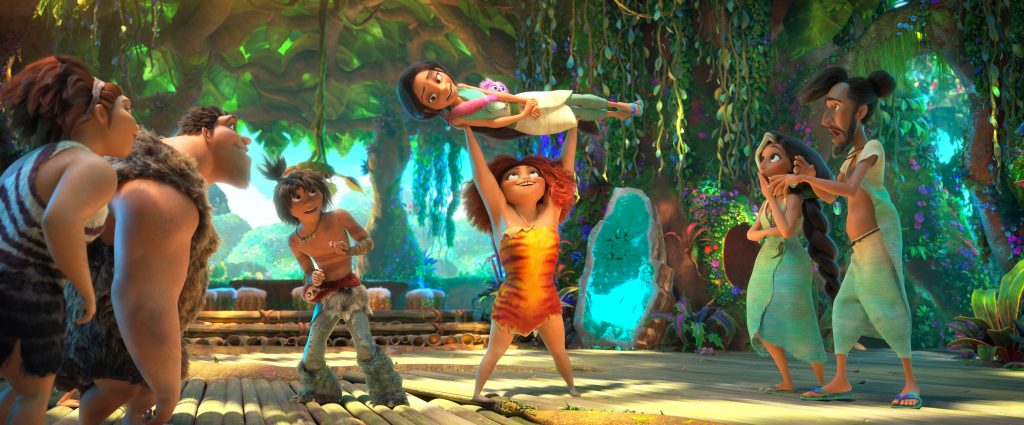January 24, 2022
by Carla Hay
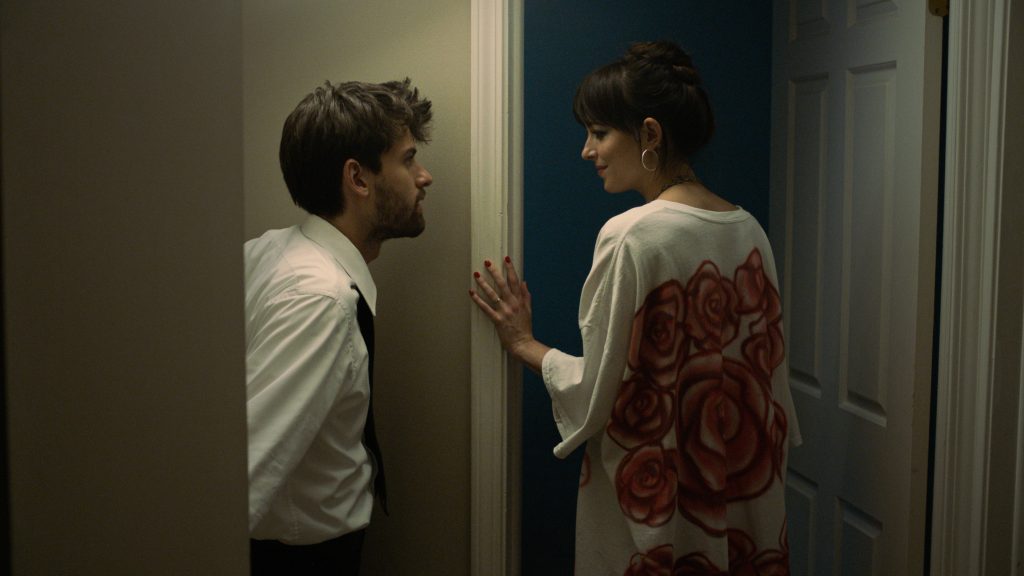
Directed by Cooper Raiff
Culture Representation: Taking place in New Jersey and briefly in New Orleans, the comedy/drama “Cha Cha Real Smooth” features a predominantly white cast of characters (with a few African Americans and Latinos) representing the working-class and middle-class.
Culture Clash: A recent college graduate struggles to find the right career path for himself as he falls in love with a divorced mother who is engaged to a lawyer.
Culture Audience: “Cha Cha Real Smooth” will appeal primarily to people who are interested in post-college coming-of-age movies.

Filmmaker/actor Cooper Raiff is in danger of typecasting himself in his movies as a dorky man-child, but “Cha Cha Real Smooth” has enough charm about awkward romances and life transitions to make up for some of the movie’s annoying self-awareness. The comedy/drama “Cha Cha Real Smooth” is the second feature film written and directed by Raiff, who has repeated certain themes and character scenarios in his two movies so far. “Cha Cha Real Smooth” had its world premiere at the 2022 Sundance Film Festival.
Raiff’s first feature film was the comedy/drama “Shithouse,” which was supposed to have its world premiere at the 2020 SXSW Film Festival, but all of SXSW was cancelled as an in-person event due to the COVID-19 pandemic. The 2020 SWSW Film Festival still awarded jury prizes, and “Shithouse” received the festival’s top award: Best Narrative Feature. Later that year, “Shithouse” had a limited theatrical release and became available on home video, with very little fanfare, although the movie got mostly positive reviews.
In “Shithouse,” Raiff plays a homesick Texas “mama’s boy” named Alex Malmquist, who’s a freshman at an unnamed Los Angeles university, where he meets and falls in love with his dorm’s resident assistant named Maggie Hill (played by Dylan Gelula), who plays “hard to get” in their relationship. In “Cha Cha Real Smooth,” Raiff plays Andrew, a 22-year-old “mama’s boy” and recent Tulane University graduate, who moves back in with his unnamed mother (played by Leslie Mann) and stepfather Greg (played by Brad Garrett) in an unnamed city in New Jersey. Andrew falls in love with a divorced mother in her 30s named Domino (played by Dakota Johnson), who plays “hard to get” in their relationship. And in Domino’s case, she really is “hard to get”: She’s engaged to a workaholic lawyer named Joseph (played by Raúl Castillo), who travels a lot for his job.
Just like in “Shithouse,” the tone and pace of “Cha Cha Real Smooth” have meandering qualities that work well in many parts of the movie and not-so-well in other parts. And once again, Raiff plays a loner protagonist pining for a love interest who is less emotionally available than he is. In many ways, “Shithouse,” which is a very conversation-driven movie, seems like a college campus version of director Richard Linklater’s 2005’s romance movie “Before Sunrise,” starring Ethan Hawke and Julie Delpy. “Cha Cha Real Smooth” widens the scope of the protagonist’s world beyond a college campus and into the “real world” of a young adult living with parents while trying to find a full-time job.
Just like Linklater does in his movies about young people in America, Raiff has his young protagonists feeling a lot of yearning and discontent over how they’re living their lives, and the filmmaker blends this angst with party scenes and some goofy comedy. Unlike Linklater, Raiff is an actor who makes himself the star of the movies that he writes and directs. “Cha Cha Real Smooth” has more emotional depth and more character development than “Shithouse” does, with some hard-hitting real-life issues that are handled with sensitivity. However, there are moments in “Cha Cha Real Smooth” where Raiff’s ego is on display, because multiple times in the movie, different women tell the character he plays how adorable he is.
Andrew studied marketing at Tulane, and he hasn’t really figured out what career path he wants to take. His college sweetheart Maya (played by Amara Pedroso Saquel) has a Fulbright Scholarship to do graduate studies in Barcelona, Spain. An early scene in the movie shows Andrew and Maya at a party, shortly before graduating from Tulane. Maya asks Andrew what his post-graduation plans are, and he half-jokingly says that he wants to go to Barcelona. The expression on Maya’s face seems to say, “That’s not going to happen. And I don’t want it to happen.”
Andrew then says he’s thinking about finding a job at a non-profit. The movie then fast-forwards to Andrew, after he has graduated from Tulane. He’s working behind the counter at a fast-food place called Meat Stix, which sells meat on sticks, such as corndogs. Obviously, it’s a job that he didn’t expect to have after graduating from Tulane. Andrew’s graduation is never shown. It’s also never shown how Maya and Andrew decided to define their relationship before she moved to Barcelona.
But it should come as no surprise that Andrew thinks that he and Maya are more committed to each other than they really are. While he’s in Barcelona, Maya won’t answer his messages. And when Andrew checks Maya’s social media, he finds out that she’s been hanging out with a new guy, who’s probably her new boyfriend. Andrew soon meets another woman who preoccupies his thoughts.
One of the repeated themes of “Shithouse” and “Cha Cha Real Smooth” is that the protagonist has a tendency to fall for women who are older (even it’s by a few years), more experienced in dating, and/or more emotionally mature. The opening scene of “Cha Cha Real Smooth” foreshadows that Andrew has this preference, when he’s shown at 12 years old at a school dance. In this flashback scene, Andrew (played by Javien Mercado) has a crush on a woman in her 20s named Bella (played by Kelly O’Sullivan), one of the dance chaperones.
Andrew confesses to his mother that he’s in love with Bella. “I know she’s old, but I think she loves me too,” Andrew says. After the dance, Andrew asks Bella out on a date. She lets him down gently by telling him: “This is the most flattered I’ve ever felt, but I’m old.” A dejected Andrew pouts in the back seat of his parents’ car during their drive home, with his parents in the front seat, and his father (played by Chris Newman) driving. As the car is in motion, Andrew’s mother climbs in the back seat to comfort Andrew. Andrew’s father is never seen or mentioned in the movie again.
It’s open to interpretation why Andrew’s biological father is not discussed in the movie. He could be dead or divorced from Andrew’s mother. Either way, he’s definitely not in the family’s life anymore, and Andrew’s mother is now married to Greg, who’s an executive at a pharmaceutical company. In “Shithouse,” the father of the protagonist was dead, and the protagonist’s mother also didn’t have a name.
And just like in “Shithouse,” the protagonist of “Cha Cha Real Smooth” has a younger sibling who adores and looks up to him. In “Shithouse,” it’s a younger sister. In “Cha Cha Real Smooth,” it’s a younger brother. Andrew’s younger brother David (played by Evan Assante), who’s about 12 or 13 years old, is a good kid who’s insecure about how to date girls. It’s implied that David and Andrew have the same biological father, because they both call Greg by his first name, not “Dad.”
Andrew and Greg dislike each other, which is apparently how it’s been between them for years. They don’t get in violent fights, but they find ways to insult each other. Andrew is more blatant about it than Greg is. Greg isn’t impressed that Andrew doesn’t really know what he wants to do with his life. Andrew thinks that Greg is too uptight and judgmental. Andrew’s mother tries to keep the peace between Andrew and Greg, but she has her own issues: She happens to be medically diagnosed as bipolar.
Many of David’s schoolmates are Jewish boys who are bar mitzvah age, and he gets invited to these bar mitzvahs. It’s why Andrew, David, their mother and Greg are at a bar mitzvah, where Andrew first sees Domino. It’s “attraction at first sight” for Andrew. Domino is with her daughter Lola (played by Vanessa Burghardt), who is about 14 or 15 years old and somewhere on the autism spectrum. When Andrew finds out that Domino and Lola are mother and daughter, and not sisters, he’s amazed because he thinks Domino looks too young to be the mother of a teenager.
Andrew thinks the party DJ isn’t doing a very good job of getting people on the dance floor, so he requests that the DJ play Lipps Inc.’s 1979 hit “Funky Town.” And the next thing you know, Andrew is leading a group dance to “Funky Town.” Yes, it’s that kind of movie.
Expect to see several dance scenes showing close-ups of Andrew bopping up and down, like he’s on a pogo stick, sometimes in slow-motion. He’s not a very good dancer, but that’s the point, because Andrew is so unapologetically dorky that it’s supposed to be endearing. Too bad Raiff has to constantly point this out by having women in the movie repeatedly tell Andrew how adorable he is.
Andrew will be going to some more bar mitzvahs in this movie, once he finds out he has a knack for choosing the right dance songs, mingling with party guests, and making sure that people at a party have a good time. Andrew introduces himself to Domino and Lola at the bar mitzvah where he first sees them. Andrew and Domino then mildly flirt each other. Andrew also develops an immediate rapport with Lola, who is socially withdrawn and is treated like an outcast by the other kids at the party. Because of her autism, Lola has been held back a few grades, so she’s a few years older than her classmates.
At one point in the evening, Domino bets Andrew $300 that he can’t get Lola to dance on the dance floor. Of course, Andrew wins the bet. It’s the beginning of Domino’s attraction to Andrew. She doesn’t tell him right away that she’s engaged to be married, but eventually she does tell him on another night. The movie also makes a point of mentioning that Domino and Andrew are not Jewish, but they keep seeing each other at bar mitzvahs.
Meanwhile, after the party where Andrew and Domino have met, about five mothers surround Andrew and tell him how adorable he is and that they want him to be a DJ at their children’s upcoming bar mitzvahs and bat mitzvahs. And that’s how Andrew starts his own party DJ business, which he calls Jig Conductor. Andrew enlists David to do a homemade promotional video for Jig Conductor, but the video doesn’t go as planned, in one of the movie’s contrived comedy scenes.
Greg is skeptical about Andrew being a party DJ as a job. When Greg asks Andrew how much Andrew will get paid for this type of work, Andrew sarcastically answers, “I think they said just under what an unhappy pharmaceutical exec makes.” Andrew makes other verbal digs at Greg in other scenes where Andrew essentially tells Greg that he thinks just because Greg is miserable, Greg doesn’t have to make Andrew miserable too.
Andrew sees Domino and Lola again at his first bar mitzvah job as a party DJ, but this event doesn’t go so well. First, Andrew gets fired before the party ends because he was rude to a rabbi who was at the party, and Andrew got involved in a fight with a boy who was bullying Lola. Second, something happens to Domino at the party which is a harrowing experience for her. Andrew finds out and comes to her rescue, which further deepens their growing bond.
Domino then hires Andrew to be a babysitter for Lola. The movie has several sweet-natured scenes of Andrew and Lola becoming friends. Lola is intelligent, kind and very socially awkward. Before Andrew comes into her life, her only friend was her beloved pet hamster Jerry. Lola is very honest, and Andrew likes her candor. Andrew also feels protective of Lola because he knows that she gets bullied by her schoolmates.
Domino and Andrew inevitably become closer too. When Andrew and Domino kiss for the first time, Domino is the one who makes the first move. But what about Joseph? He’s in Chicago a lot because of a client’s lawsuit. Andrew eventually meets Joseph, who is polite but somewhat emotionally closed-off and not very talkative. Joseph remains a mystery throughout the entire movie, with nothing really revealed about him except that he’s a very busy lawyer.
The rest of the movie is about Andrew falling in love with Domino, who sends mixed signals about how far she wants the relationship to go with him. At one point, Domino tells Andrew, “I feel very comfortable with you. I don’t know why.” Later in the movie, Domino says to Andrew: “You know what you look like now? You look like the sweetest person ever.”
However, there are some red flags that Andrew wants to ignore, such as Domino telling him that she would like to move to Chicago to start a new life and to possibly go to school to get her college degree. Domino says that Joseph would rather stay in New Jersey. (“Cha Cha Real Smooth” was actually filmed in Pennsylvania.) And there’s an age difference and lifestyle difference between Andrew and Domino that they don’t really discuss until much later in the movie.
Andrew takes the way that Domino gets emotionally close to him as a sign that Domino and Joseph are having problems in their relationship. Andrew doesn’t seem too concerned with finding out how long Domino and Joseph have been together, or when they plan to get married. Andrew doesn’t ask these questions, but Domino is also somewhat guarded about certain things in her life. She eventually tells Andrew that she has abandonment issues because her ex-husband (Lola’s father) left her and Lola. Domino also reveals that she’s been depressed ever since she was a child.
“Cha Cha Real Smooth” gets its title from a line in DJ Casper’s 2000 hit “Cha Cha Slide,” a novelty tune that’s played in one of the movie’s bar mitzvah scenes. The movie has a few subplots, such as Andrew giving David romance advice because David has a crush on a classmate named Margaret (played by Brooklyn Ramirez), who might have a romantic interest in David too. Andrew also casually dates a former high school schoolmate named Macy (played by Odeya Rush), who was his crush in high school.
Maya isn’t too far from his mind, because Andrew confides in his mother that he’s saving his money to eventually go to Barcelona. Andrew claims his Barcelona trip has nothing to do with Maya, who’s been ignoring him, but Andrew’s mother looks like she doesn’t believe him. Andrew also applies for a job at a non-profit group called Hope Loves a Friend, which helps underprivileged and disabled kids.
“Cha Cha Real Smooth” has characters with disabilities or mental illnesses, which are issues that weren’t in “Shithouse.” These issues are handled in “Cha Cha Real Smooth” with mixed results. Lola isn’t depicted as an offensive stereotype of autism, but as a fully developed human being with clear thoughts and feelings. The scenes with Lola and Andrew are among the best in the movie.
However, the bipolar condition of Andrew’s mother seems like a plot device that’s never realistically shown or explored in a meaningful way. It’s mentioned a few times in the movie that Andrew’s mother has had recent “manic” episodes in public, but these manic episodes and her depression are never shown. Instead, her entire personality in the movie is as an even-tempered, supportive mother.
It’s as Raiff just wanted to tack on a “mental illness” description for the mother to make it seem like this movie is deeper than it really is. At Andrew’s job interview with Hope Loves a Friend, Andrew mentions that his mother is bipolar as a way to prove that he’s qualified for the job. Then, he blurts out a lie about another member of his family having a mental disability, then he promptly admits that it’s a lie. It’s a moment when the movie namechecks a disability for a cheap laugh, especially when viewers find out if Andrew got the job or not.
Domino is another person in Andrew’s life who’s had a long history of depression. And that part of her life and personality are shown in fleeting moments. Mostly, Domino seems like someone who doesn’t really think she’ll find true happiness, but she wants stability, which she thinks she can get in her relationship with Joseph. “Cha Cha Real Smooth” doesn’t seem to want to show anything realistic when it comes to the hardest things people with depression or bipolar disorder have to deal with in their everyday lives.
Andrew can be compassionate, but he can be self-absorbed in many ways. For example, when things in Andrew and Domino’s relationship aren’t going the way that Andrew hoped they would, he takes his anger and frustration out on his brother David. When David asks Andrew for some love-life advice, Andrew snaps at David and verbally insults him in a very mean-spirited way. It’s supposed to show how “human” Andrew is and that this “nice guy” isn’t so perfect.
The dialogue in this movie can sometimes be clunky, but there are also scenes where the dialogue is very realistic. Raiff, Burghardt and Assante stand out as giving believable performances. Johnson has played many coquettish types before, Mann has played many nurturing mothers before, and Garrett has played many grumpy characters before, so all three of these cast members don’t do much that’s new in this movie. It remains to be seen if Raiff is going to follow the Woody Allen path of filmmaking, by playing a version of himself in the movies where he’s the director, writer and protagonist star. Raiff seems capable of playing more than this type of neurotic lovelorn character, so it will be interesting to see if he can show more acting range in his future movies.
“Cha Cha Real Smooth” has some unanswered questions that aren’t really plot holes, but they indicate that the screenplay needed improving. Viewers might wonder: “What happened to Andrew’s father?” “If Lola is such an outcast at her school, why does she keep getting invited to these bar mitzvahs?” (Lola and Domino go to three of them during the course of the movie.) “How have Andrew and David been affected by their mother’s bipolar condition?” By throwing in all of the issues and not adequately addressing them all, “Cha Cha Real Smooth” looks like it bit off more than it could chew. There was a simple clarity about “Shithouse” that’s missing in “Cha Cha Real Smooth.”
“Cha Cha Real Smooth” is a series of scenes and vignettes that have just enough in each scene to resonate with viewers. Andrew is like a lot of recent college graduates who have to move back in with parents and who don’t have their entire lives figured out yet. He’s a flawed “nice guy” who likes to make people feel good about themselves, but he can also say mean and stupid things when he’s drunk. Raiff’s greatest strength as a filmmaker is showing these human frailties of people doing the best that they can to accept themselves in a world where they can get rejected and things don’t always go as planned.
UPDATE: Apple Studios will release “Cha Cha Real Smooth” in select U.S. cinemas and on Apple TV+ on June 17, 2022.

